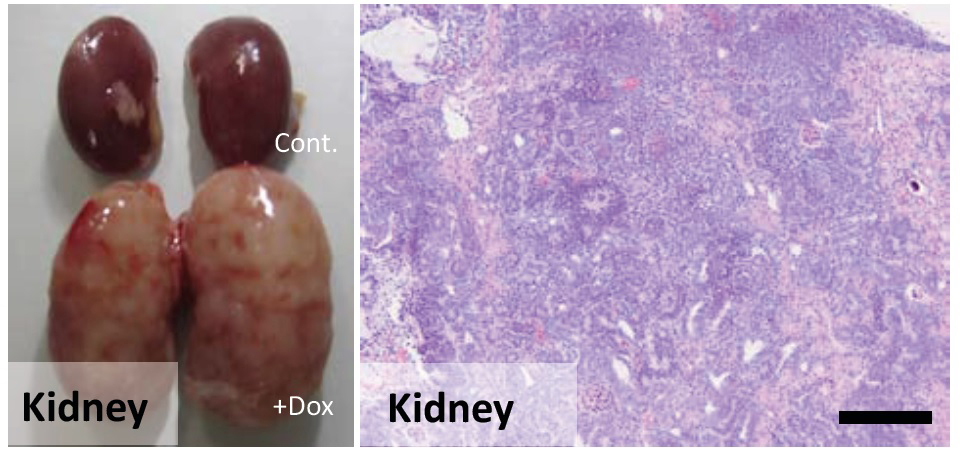
News & Events
News & Events
News
February 14, 2014
Elucidation of carcinogenic mechanism not involving gene mutation Application of iPS cell technology
A research team led by CiRA Professor Yasuhiro Yamada's group has discovered that, when cells are subjected to incomplete reprogramming in vivo, epigenetic modifications take place which promote carcinogenesis. The findings of the research by the group including postgraduate student Kotaro Onishi (Kyoto University, CiRA/Gifu University Graduate School) and researcher Katsunori Semi (Kyoto University CiRA/iCeMS) were published on February 13, 2014 (U.S. Eastern time) in the U.S. scientific journal Cell.
iPS cells and cancer cells have the common attribute of being capable of unlimited proliferation, but whereas cancer is thought to arise through a series of gene mutations, iPS cells are generated by reprogramming somatic cells, which need not involve any gene mutation.
However, when mouse cells were exposed in vivo to four reprogramming factors (Oct3/4, Sox2, Klf4, c-Myc) in such a way as to cause incomplete reprogramming, a major change occurred in the DNA methylation pattern (epigenome), resulting in tumorigenesis in a range of tissues. Tumors arising in the kidney through this process were very similar to Wilms' tumor, a pediatric kidney cancer, in terms of histological and molecular biological features. An examination of the cells of these tumors revealed no gene mutation, but did identify modifications in the epigenome, which was found to have altered to a pattern resembling that of pluripotent stem cells. Furthermore, the researchers were able to generate normal kidney cells from iPS cells created by reprogramming the tumor cells. These findings indicate the possibility that epigenetic regulation may promote tumorigenesis in certain types of cancer.
The findings of the research demonstrated that incomplete reprogramming using a procedure devised to reprogram mouse cells in vivo leads to the formation of tumors resembling nephroblastoma. Previously it had been thought that cumulative gene mutations were important in oncogenesis. However, the results of the present research indicate that, with certain types of tumor, cancer can be triggered not by gene mutation, but by epigenetic alterations. In other words, if it were possible to alter epigenetic conditions, it might be possible to alter the properties of cancer cells, which could lead in the future to new cancer therapies.
The present research additionally made use of iPS cell technology to develop a technique for epigenetic regulation that does not induce genomic mutation. It is hoped that using iPS cell technology in this way will bring new perspectives to disease research.

Fig. 1 Mouse kidney subject to the action of reprogramming factors for 7 days
Appearance of kidney exposed to four reprogramming factors for 7 days and then left for a further 7 days. Compared to the control kidney, the kidney exposed to the reprogramming factors has grown larger due to tumor formation. The right-hand image shows the histological stain pattern of a +Doxycyclin kidney. Scale bar: 200 μm.
Paper Details
- Journal: Cell
- Title: Premature termination of reprogramming in vivo leads to cancer development through altered epigenetic regulation
- Authors:
Kotaro Ohnishi*, Katsunori Semi*, Takuya Yamamoto, Masahito Shimizu, Akito Tanaka, Kanae Mitsunaga, Keisuke Okita, Kenji Osafune, Yuko Arioka, Toshiyuki Maeda, Hidenobu Soejima, Hisataka Moriwaki, Shinya Yamanaka, Knut Woltjen, Yasuhiro Yamada**
*) These authors contributed equally to this work.
**) Corresponding author






















